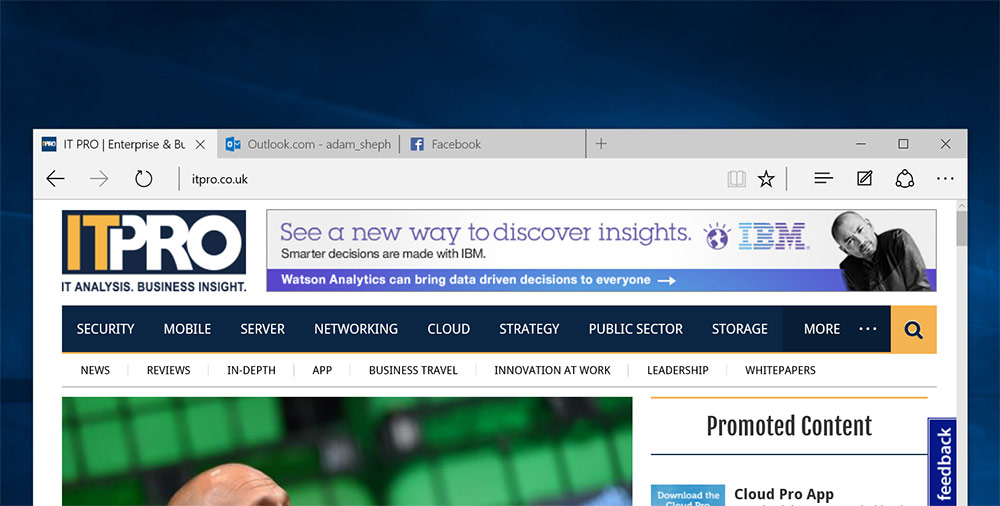Microsoft cuts search data retention to six months
Microsoft will delete IP addresses after six months, besting Google's nine month data retention policy.


Sign up today and you will receive a free copy of our Future Focus 2025 report - the leading guidance on AI, cybersecurity and other IT challenges as per 700+ senior executives
You are now subscribed
Your newsletter sign-up was successful
Microsoft has made good on its promise to drop IP addresses from search data after six months, meeting the pleas of privacy advocates.
Microsoft previously promised to cut its data retention time, but only if its rivals also did. Now, it's decided to go ahead with the move without Google, which holds IP addresses of searches for nine months. Yahoo holds such data for just three months.
Peter Cullen, Microsoft's chief privacy strategist, said in a blog post that it was an "important change."
"We will delete the entire Internet Protocol address associated with search queries at six months rather than at 18 months," he explained.
"Under our current policy, as soon as Microsoft receives a Bing search query we take steps to de-identify the data by separating it from account information that could identify the person who performed the search," he added.
Now, the IP address, "de-identified cookie" and other session identification will be deleted after six months.
The change will roll out across Bing over the next 12 to 18 months, Cullen noted.
Sign up today and you will receive a free copy of our Future Focus 2025 report - the leading guidance on AI, cybersecurity and other IT challenges as per 700+ senior executives
Cullen credited the Article 29 Working Party with the change. The group is made up of European data protection regulators which advise the European Commission on data protection. The Working Party has long called for Google to cut its retention to six months.
But Cullen also said the change is because of the "current competitive landscape," suggesting Bing is trying to better Google on the issue.
Freelance journalist Nicole Kobie first started writing for ITPro in 2007, with bylines in New Scientist, Wired, PC Pro and many more.
Nicole the author of a book about the history of technology, The Long History of the Future.
-
 AWS CEO Matt Garman isn’t convinced AI spells the end of the software industry
AWS CEO Matt Garman isn’t convinced AI spells the end of the software industryNews Software stocks have taken a beating in recent weeks, but AWS CEO Matt Garman has joined Nvidia's Jensen Huang and Databricks CEO Ali Ghodsi in pouring cold water on the AI-fueled hysteria.
-
 Deepfake business risks are growing
Deepfake business risks are growingIn-depth As the risk of being targeted by deepfakes increases, what should businesses be looking out for?
-
 Microsoft hikes Bing Search API prices to “reflect technology investments”
Microsoft hikes Bing Search API prices to “reflect technology investments”News Microsoft cited recent high-profile investments in Bing as justification for the price increases
-
 Google looks to shake up the way the tech industry classifies skin tones
Google looks to shake up the way the tech industry classifies skin tonesNews The tech giant is pursuing better ways to test for racial bias in tech products
-
 DuckDuckGo vs. Google: Privacy or popularity?
DuckDuckGo vs. Google: Privacy or popularity?Vs Google may reign as king, but it’s not the only option in the world of search
-
 How to change your search engine in Microsoft Edge
How to change your search engine in Microsoft EdgeTutorials If you'd rather search through Google than Bing, here's how to change your default search provider in Windows 10's new browser
-
 Microsoft joins Google in war on revenge porn with removal requests
Microsoft joins Google in war on revenge porn with removal requestsNews Both Google and Bing will allow people in explicit images to request they be removed from search results
-
 Microsoft Bing will encrypt by default
Microsoft Bing will encrypt by defaultNews Microsoft will also no longer pass on customer search queries to marketers
-
 Google's top 2014 search trends revealed
Google's top 2014 search trends revealedNews Google 2014 trends have been unveiled, and include the year’s biggest sporting events, tech releases, cat stats and more
-
 Google right to be forgotten rule extends to Bing & Yahoo
Google right to be forgotten rule extends to Bing & YahooNews The EU’s controversial right to be forgotten ruling against Google will now also apply to Yahoo and Bing
